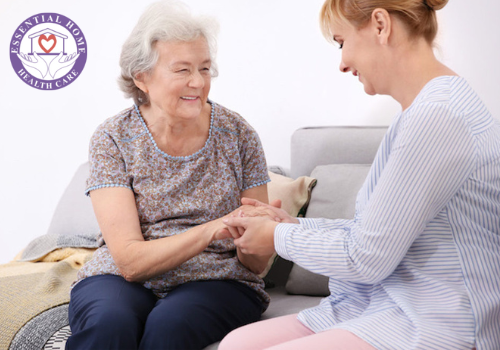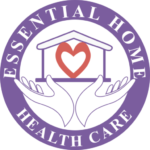Older adults take prescription medications at a higher rate than any other demographic. It can be difficult to remember to take the medication in the first place, so taking multiple medications several times a day can be overwhelming. What are the best medication management strategies for home healthcare?

Medication management is critical in the management of a health condition. Missed doses or incorrect administration can be extremely dangerous. If you are a caregiver for a loved one, that person relies on you to ensure they take the medications they need on time.
Our skilled, licensed nurses at Essential Home Health are medication management experts. Here are our top five tips for managing your medications or those of a loved one.
1-Purchase a pillbox or dispenser
Although it’s a common solution, many people begin medical regimens without considering the need for a pillbox. These boxes are usually labeled daily and have seven compartments for each of the seven days of the week.
Planning can help you manage your medications and avoid running out unexpectedly. Pillboxes are a great way to keep your medications organized while reminding you when to refill prescriptions.
Pillboxes come in various sizes, colors, and shapes; however, if you’re unsure which to get, consult your doctor or pharmacist to see what would be best for your medications. Make sure that whatever you choose has a large enough compartment to hold all your prescribed pills.
Similarly, you can purchase an automatic dispenser that can be programmed to dispense your medications at a predetermined time each day. Some will even call you or your caregiver if you don’t take your medications that day. These vary in price and functionality, but if you find yourself forgetting even with a pillbox, they are worth the investment.
2-Establish reminders
While a pillbox can assist you in staying organized, a reminder is an additional step to help you stay on track.
If an elderly person does not have a smartphone, alarm clocks and other reminder systems are excellent gifts and useful tools. If they do, another simple and effective way to set reminders is to set a reminder on their phone. Caregivers can set similar reminders for themselves.
Some reminder devices are specifically marketed to older adults; these allow you to program reminders in any language and at any time, multiple times per day. Devices like this remove the “nag” factor from mundane tasks for caregivers. This frees up your time for more important things, such as spending quality time with your loved one. However, you do not need a device marketed specifically to seniors. Another simple, low-cost option to program and use is a multi-alarm alarm clock.
3-Use a single pharmacy if possible
Though it may be convenient to stop by the nearest drugstore after a doctor’s appointment or the hospital pharmacy before being discharged, it is best to have all your prescriptions filled at the same pharmacy. While you can transfer prescriptions between pharmacies, information may be lost or delayed during the transfer. This can cause refills to be delayed.
Most pharmacists now keep an electronic record of all prescriptions a patient has filled, making it easier to identify “red flag” drug combinations that may cause a problem. Essential Home Health provides home care medication management so contact them without hesitation.
4-Store your medications correctly and take them as directed
Many medications include instructions for storage. While most people prefer to sit in a dry, cool environment, some items must be refrigerated. It’s critical to write these things down somewhere you’ll see them. The bathroom, which heats up and becomes humid when you shower or bathe, is not the best place to keep your medication. Perhaps the living room or bedroom would be a better choice.
You can go over medication instructions with your doctor and pharmacist. Take the recommended amount at the recommended time. Determine whether you should take your medication with or without food or water. Find out if it’s safe to drink alcohol while taking your medications. Ask what you should do if you forget to take a dose—should you take it when you remember, or should you skip it if it’s too close to the next one? Never stop taking prescription medication or changing the dosage without consulting your healthcare provider.
5-Schedule regular medication reviews with your doctor
Is there anything you should stop taking? Could combining two or more of your medications be dangerous? Are you experiencing any side effects such as dizziness or nausea? Discuss all your prescription and nonprescription medications with a healthcare provider—a yearly “spring cleaning” of your medicine cabinet is a good approach. Herbs and supplements are included. Bring a list of your medications or all your pill bottles with labels.
Whether you’re managing your or a loved one’s medication, organizing and automating the more mundane aspects can relieve prescription-related stress. Essential Home Health’s skilled nursing care can help you manage your medications safely and effectively, eliminating the need to remember everything on your own.
Whether you’re managing your or a loved one’s medication, organizing and automating the more mundane aspects can relieve prescription-related stress. Essential Home Health’s skilled nursing care can help you manage your medications safely and effectively, eliminating the need to remember everything on your own. In our another post, learn more about medication management services for seniors to consider. We have the nurses that come to your house, so contact us at 847-813-6301.
